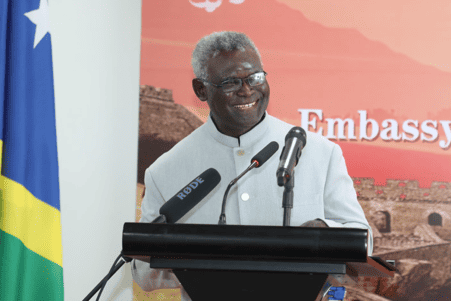On the China-Solomon Islands Security Cooperation, “We have no say on the SI-China agreement. We respect Solomon Islands sovereign decision. There is no misunderstanding,” stated the White House Official.
White House official Kurt Campbell has reassured Solomon Islands Prime Minister Manasseh Sogavare that the United States was back. “We will do better,” he said, and committed to do more in Solomon Islands.
As U.S National Security Council Coordinator for the Indo –Pacific, Campbell led a delegation last week adding the U.S will provide more assistance in addressing unexploded ordnance, supplying COVID 19 vaccines, provide medical support, reopen the Peace Corps programme and look at expanding the SCALE Programme to other provinces. U.S is committed to ensuring the clearing of the WW2 EOD and would look into the issue of oil spill in the Iron Bottom Sound.
Meanwhile, he stated “We have no say on the SI-China agreement. We respect Solomon Islands’ sovereign decision. There is no misunderstanding,” stated White House official Kurt Campbell on the Solomon Islands security deal as Solomon Islands Prime Minister Manasseh Sogavare welcomed senior U.S officials into the country.
However the Biden administration on Friday warned the Solomon Islands that the U.S will take unspecified action against the nation should its recently concluded cooperation agreement with China pose a threat to U.S or allied interests.
“The U.S delegation outlined clear areas of concern with respect to the purpose, scope, and transparency of the agreement… If steps are taken to establish a de facto permanent military presence, power-projection capabilities, or a military installation, the delegation noted that the United States would then have significant concerns and respond accordingly,” the White House said in a statement.
The two states reportedly are scheduled to meet again in September to advance identified areas of cooperation.
Australia’s “red line”
Australian Prime Minister Scott Morrison says China building a military base on Solomon Islands would be the “red line” for Australia and the United States, but did not say how Australia would respond if it happened.
“This is a shared concern, not just Australia, this is Australia and regional governments, particularly places like Fiji and Papua New Guinea… Working together with our partners in New Zealand and of course the United States, I share the same red line that the United States has when it comes to these issues… We won’t be having Chinese military naval bases in our region on our doorstep,” Morrison said.
Cuts to foreign aid
On Saturday, Australian Shadow Treasurer Jim Chalmers flagged that he believed cuts to foreign aid by the Australian government were partly to blame for the controversial deal going ahead, “by being a credible partner on climate change, having a credible climate change policy”.
In the past decade, spending on foreign aid has been slashed by a third, but Australia remains the biggest donor in the Pacific with $1.7 billion (US$1.2 billion) set aside for the region a year, in which US$123 million is received by the Solomon Islands. However, its share has fallen since the end of RAMSI — Australia’s multi-year assistance mission to the nation.
Japan closely eyes China
Japan is keeping a close eye on China’s behaviour concerning Pacific island nations, Prime Minister Fumio Kishida said Saturday after meeting with his Tuvalu counterpart. “We exchanged views on recent developments concerning China in the Pacific island region,” Kishida told reporters in the southwestern prefecture of Kumamoto, without giving further details “We are closely following what China does in the Pacific island region with interest,” Kishida said.
